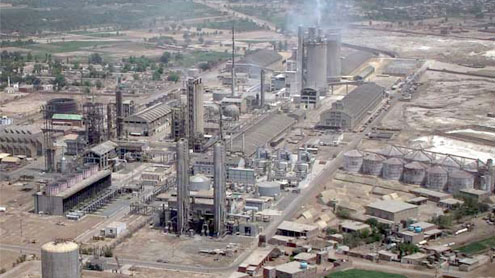 Pakistan: Whenever a homemade bomb kills a US soldier in Afghanistan, the chances are its main ingredient came from a factory in Pakistan, a trend that has emerged as the latest source of friction in already frayed US-Pakistan relations.
Pakistan: Whenever a homemade bomb kills a US soldier in Afghanistan, the chances are its main ingredient came from a factory in Pakistan, a trend that has emerged as the latest source of friction in already frayed US-Pakistan relations.
A US Congressional panel has frozen $700 million in aid to Pakistan until it gives assurances it is helping fight the spread of bombs in the region by regulating the distribution of calcium ammonium nitrate fertilizer from the Pakarab company. US officials have visited the complex in the dusty city of Multan over the last two years to seek the management’s help in preventing militants from smuggling fertilizer that can be used to make bombs for use over the border in Afghanistan.Company officials say they have cooperated.
Bags containing ammonium nitrate, which is used in many of the homemade bombs known as improvised explosive devices (IEDs) that are so effective against US troops in Afghanistan, now have different colouring.The company is also trying to dye the fertilizer differently to help authorities track it.“It is wrong to single Pakistan and us out, especially as we are doing all that they want us to do,” Pakarab Fertilizers chief executive officer Fawad Mukhtar told Reuters.“We have told them that this is made throughout the region and Pakistan is not the only source. We have also told them that huge quantities of this fertilizer are made in Iran, Uzbekistan and across Central Asia.”
But the US Congress is not in a very flexible mood and Pakarab is likely to remain in focus.US officials say the vast majority of material used to make IEDs in Afghanistan comes from Pakarab’s factories, especially the one in Multan, a city in Punjab province surrounded by cotton fields.Calls are growing in the United States to penalise Islamabad for failing to act against militant groups and, at worst, helping them, after the secret US raid on a Pakistan garrison town in which al Qaeda leader Osama bin Laden was killed in May.The freeze on US aid was agreed as part of a defence bill that is expected to be passed this week. However, securing tighter Pakistani regulation of ammonium nitrate, which is banned in Afghanistan, will be difficult.
The fertilizer is churned out at the huge, grey Pakarab complex with chimneys smoking 24 hours a day. About 600,000 tonnes is produced annually.Yet company officials, fertilizer dealers and workers say the problem lies outside the heavily guarded, barbed-wired and cement walls around the complex.
“We just get an order and we fill it”Porous borders and rampant corruption make it easy to smuggle fertilizer into Afghanistan.Standing just outside the factory at a loading station with dozens of trucks, a fertilizer dealer boasts about how easy it is to smuggle with impunity in Pakistan, a poor country heavily dependent on US aid.
Customs officials and police are often accused of supplementing low wages by taking bribes from smugglers who move their goods across the frontier by pickup trucks, motorcycles, bicycles and donkey carts.“You can call it smuggling or anything else,” said Sarwar Baloch, wearing traditional baggy trousers and shirt.“We don’t ask questions, we don’t know what it’s used for. We just get an order and we supply it.”Dealers who buy in bulk from the factory sat in shops beside desks stacked with orders and receipts.They say it’s impossible for them to tell whether their customers are legitimate farmers or militants intent on blowing up US and other forces in Afghanistan.
“I read in the news today that $700 million of aid has been stopped. If this is so damaging for Pakistan they should shut down the factory or make it produce urea fertilizer instead,” said dealer Afroz Abbas, 48, sitting beside sacks of fertilizer.“God has provided an alternative for everything.”
So far, Pakistan has only produced draft legislation to tackle the problem. Even if it passes, many doubt the spread of IEDs can be prevented.“We received a notification a year-and-a-half ago to monitor this fertilizer because religious extremists were reportedly purchasing it in large amounts,” said a senior police official in Multan, who asked not to be named.“There is no way we can stop fertilizer smuggling. We don’t have the capacity to track every bag.” – Khaleejnews












